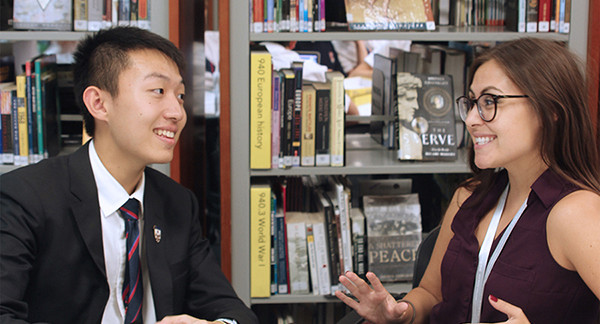

Education News Highlights: July 14 — July 20
The most important education news of the past week — in the weekly digest by ED-EX.com.
American Teens See Higher Education as Key to Success
According to a newly released AP-NORC poll, around 60% of U.S. teenagers aged 13 to 17 consider earning a college degree to be “extremely” or “very” important for their future. The sentiment is especially strong among girls — 70% compared to 54% of boys.
Teens view higher education not only as a pathway to employment: about 70% see it as essential for their future careers, and 60% value it as a way to gain life skills and develop their identity. Many also associate college with becoming more socially and civically aware.
At the same time, most young people are skeptical about achieving other life milestones. Seven in ten believe it will be harder for them to own a home compared to their parents, and more than half think starting a family and maintaining a decent standard of living will be more difficult than for the previous generation.
Despite their optimism about education, teens express concern over rising tuition costs and the challenges graduates face in the job market. Many fear student debt and uncertainty about future employment.
U.S. to Release Over $1 Billion in Frozen After-School Funding
In early July, the Trump administration temporarily froze approximately $6.8 billion in federal education grants, citing concerns that some funds could support a “radical left-wing agenda.”
The freeze affected funding for programs such as:
- support for migrant students,
- teacher training and development,
- English language instruction,
- after-school and summer programs.
Following a lawsuit by more than 20 states and a letter from 10 Republican senators calling for the funds to be released, the administration agreed to unfreeze a portion of the grants — amounting to roughly $1 to $1.4 billion.
The remaining $5 billion is still under review. The lack of funding has already led to serious disruptions, including program cancellations, hiring delays, and the suspension of summer learning initiatives.
New Zealand Expands Work Rights for International Students
New Zealand aims to become a more attractive destination for international students by 2034 through its new “International Education: Going for Growth Plan.”
Key reforms include increasing the maximum number of weekly work hours from 20 to 25 hours during academic terms, streamlining visa processes, and introducing a post-study work visa for graduates of vocational programs. These changes are intended to attract more students from abroad and improve their integration and financial independence.
According to a July 14 announcement from Immigration New Zealand (INZ):
- Starting November 3, 2025, the permitted work limit for international students will rise from 20 to 25 hours per week during semesters.
- The expanded rights will also apply to high school students in Years 12 and 13, provided there is written approval from both parents and the school, and to students enrolled in one-semester exchange or study abroad programs.
In addition, the government has proposed a six-month post-study work visa for graduates of sub-degree and vocational qualifications. This visa is intended to serve as a bridge to the Accredited Employer Work Visa (AEWV), giving students extra time to secure employment with an AEWV-accredited employer and transition to a full work visa.
Work is also underway to simplify access to multi-year student visas, making long-term academic study more feasible for international students.
Another important policy shift affects students transferring between institutions or changing qualification levels: they will now be required to apply for a new visa, rather than request a variation of their current one. This change is aimed at improving monitoring and ensuring greater transparency.
By 2034, the government aims to:
- Increase international student enrolment from 83,400 (2024) to 119,000,
- Double the economic contribution of the sector from NZ$3.6 billion to NZ$7.2 billion,
- Improve New Zealand’s global appeal so that 22% of international students rank it among their top three choices, up from 18% currently.
UNESCO Raises Alarm: 272 Million Children Out of School Worldwide
A new report from UNESCO reveals that 272 million children and adolescents across the world are currently out of school — a staggering increase of 21 million since October 2024.
The organization has set a target to reduce this number by 165 million by 2030, calling on countries to uphold their commitments. UNESCO recommends allocating 4–6% of GDP and 15–20% of national budgets to education as part of this global effort.
According to the report, the out-of-school rate by education level is as follows:
- 11% of children at the primary level,
- 15% at lower secondary,
- 31% at upper secondary.
National targets aim to bring these rates down by 2030 to:
- 2% for primary education,
- 5% for lower secondary,
- 16% for upper secondary.
If met, these targets would reduce the number of out-of-school children to 107 million, a global drop of 165 million over the next five years.
Florida State University and Universal AI University: What Will This Unexpected Partnership Bring?
Florida State University (USA) and Universal AI University (India) have announced a strategic partnership in the fields of artificial intelligence and entrepreneurship.
The Jim Moran College of Entrepreneurship (part of FSU) and UAi will collaborate on joint research and educational initiatives aimed at integrating AI into entrepreneurial practice. JMC will co-found the new Center for AI and Entrepreneurship at UAi, helping shape its programs, projects, and global partnerships.
In addition, the partnership includes quarterly webinars titled “AI & Entrepreneurship.” The first session is scheduled for September 4, 2025, and will be open to all — from students to researchers and professionals.
Why is this partnership important?
- First, it creates new opportunities for students and scholars — including knowledge exchange, participation in interdisciplinary projects, and international research collaborations.
- Second, it promotes the practical application of AI in entrepreneurship, supports family businesses, and contributes to poverty alleviation.
- Third, the collaboration strengthens international academic ties and highlights the growing role of AI in higher education.
According to Eric Liguori, Associate Dean of JMC, “This partnership represents a powerful step forward in equipping students to lead in a rapidly evolving digital economy. We are excited to collaborate with UAi in creating new knowledge and empowering entrepreneurial leaders who can leverage AI for real-world impact.”
India Launches Teacher Exchange Program
The city of Varanasi has become the host of a new exchange under the Fulbright Teachers for Global Classrooms (TGC) program, where educators from the United States and India come together to share knowledge and best practices in education.
Three American teachers — Alize Rabideau, Jamie Schorsch, and Susan Mathison — took part in a weeklong academic visit to Sant Atulanand Residential Academy (SARA), a boarding school located in the Holapur area of Varanasi. The visit took place from July 11 to 17.
During their stay, the delegates visited local schools, engaged with students and teachers, and participated in cultural excursions, lectures, and interactive sessions. The exchange emphasized intercultural understanding, technological integration, and sustainable development in education.
According to a press release, the visit marks an important step in advancing global cooperation and strengthening cross-cultural exchange. It also reflects Varanasi’s growing significance in contemporary educational initiatives.
Fulbright Teachers for Global Classrooms is a yearlong professional development and short-term exchange program for U.S. primary and secondary school teachers. It helps educators bring a global perspective to their classrooms through targeted training, international experience, and global collaboration.
Cambridge Elects a New Chancellor
The University of Cambridge is holding a historic election for its next Chancellor — a largely ceremonial yet highly prestigious role. Voting began on July 9 and concluded on July 18. This marks a significant milestone for one of the world’s oldest universities: for the first time, the election was conducted in a hybrid format (both online and in person), and the position now carries a 10-year term limit instead of a lifetime appointment.
The 2025 election drew considerable public attention, with ten candidates running for the post — a diverse group that included academics, politicians, activists, business leaders, and philanthropists.
Among the most prominent contenders is Gina Miller, a British lawyer and political activist known for her legal challenge against Brexit. Other notable candidates include Lord Smith of Finsbury, a former culture minister and ex-Master of Pembroke College, and Lord Browne, the former CEO of BP.
The results will be announced on July 23. The new Chancellor will represent the university at ceremonies, take part in public events, support fundraising campaigns, and serve as a symbolic ambassador of Cambridge’s values.
Formula E Launches Global STEM Program “Driving Force”
Formula E, supported by the Public Investment Fund of Saudi Arabia (PIF E360), has officially launched “Driving Force Presented by PIF” — a global STEM initiative aimed at equipping students aged 8 to 18 with skills in science, technology, sustainability, and environmental innovation.
The initiative merges sports culture with science to prepare young people for future challenges. It includes interactive workshops and free online resources for teachers and students.
The first events have already taken place in three countries: the UK, the United States, and Saudi Arabia. In mid-July, a series of workshops was held in London, where students explored how STEM knowledge applies in real-life ecosystems — including electric mobility and green technologies, using an Expo-race format.
Despite launching in only a few countries, the initiative has a global ambition: to reach and educate over 50,000 students worldwide by the end of 2025.
“Driving Force” addresses the growing demand for skilled professionals, particularly in the UK — where, according to PwC research, the country may face a shortage of 200,000 green tech workers by 2030. In addition to keeping students engaged with STEM subjects, the program encourages future careers in motorsport, engineering, energy, and beyond.
Australia Launches $14M Green Fellowship Program
The University of New South Wales (UNSW) has announced the launch of a new international Green Fellowship program, designed to attract twelve leading researchers from abroad. The initiative is backed by AUD 14 million in funding.
The program focuses on advancing applied research in artificial intelligence, green hydrogen, and healthcare, while also fostering long-term academic collaboration.
Each fellow will receive funding for a period of one to two years, with potential pathways to continued employment. The grants also include support for postgraduate researchers, enabling the formation of fully-fledged research teams. Particular emphasis is placed on international mobility, knowledge exchange, and building lasting academic links between Australia and institutions across the U.S., Europe, and beyond.
According to UNSW Vice-Chancellor Attila Brungs, the program offers a rare opportunity to attract “the brightest minds” amid growing instability in research systems elsewhere — including the United States — helping Australia reinforce its position in the global research landscape.
University of Florida Scientists Develop Universal Cancer Vaccine
In a breakthrough especially relevant to medical students, researchers at the University of Florida (not to be confused with Florida State University) have developed an experimental therapeutic mRNA vaccine that could activate the body’s immune system to attack tumors — without needing to tailor it to specific cancer types.
Unlike traditional approaches that target tumor-specific proteins, the new vaccine mimics a viral infection to trigger a strong immune response. It also boosts expression of the PD-L1 protein on tumor cells, making them more visible to the immune system and enhancing the effectiveness of immunotherapy.
Conventional cancer treatment often requires highly personalized approaches — from diagnosis to selecting molecular targets and designing a custom vaccine. In contrast, this new method does not rely on specific mutations, potentially making it suitable for off-the-shelf use.
The team is now working on optimizing the vaccine’s formulation and preparing for the first human clinical trials. If the results mirror those seen in animal models, the vaccine could usher in a new era of cancer treatment, offering a scalable, accessible, and effective option for a wide range of patients.
All About Education Abroad and Beyond


Where Students Applied in 2025 — and What This Means for 2026 Applicants


